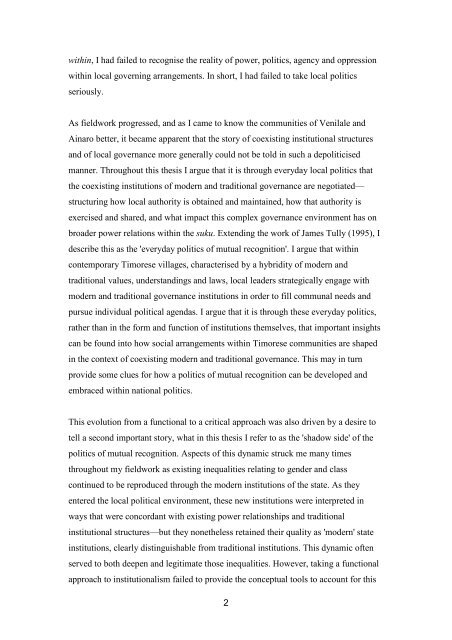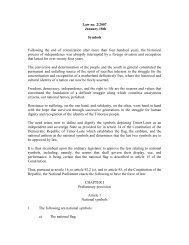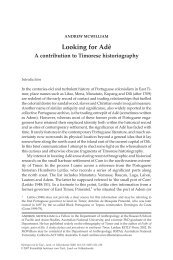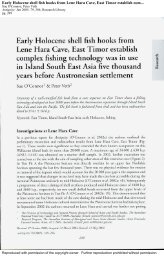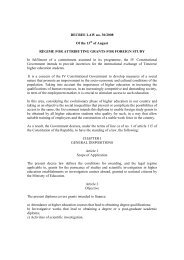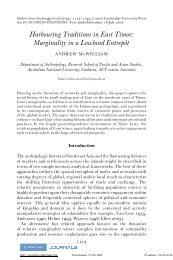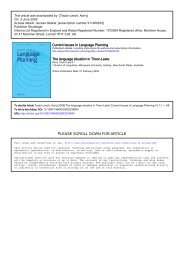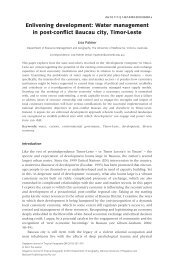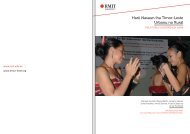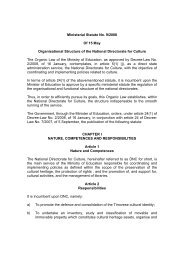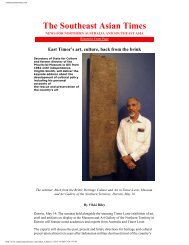Local Governance in Timor-Leste - Secretaria de Estado da Arte e ...
Local Governance in Timor-Leste - Secretaria de Estado da Arte e ...
Local Governance in Timor-Leste - Secretaria de Estado da Arte e ...
- No tags were found...
Create successful ePaper yourself
Turn your PDF publications into a flip-book with our unique Google optimized e-Paper software.
with<strong>in</strong>, I had failed to recognise the reality of power, politics, agency and oppressionwith<strong>in</strong> local govern<strong>in</strong>g arrangements. In short, I had failed to take local politicsseriously.As fieldwork progressed, and as I came to know the communities of Venilale andA<strong>in</strong>aro better, it became apparent that the story of coexist<strong>in</strong>g <strong>in</strong>stitutional structuresand of local governance more generally could not be told <strong>in</strong> such a <strong>de</strong>politicisedmanner. Throughout this thesis I argue that it is through every<strong>da</strong>y local politics thatthe coexist<strong>in</strong>g <strong>in</strong>stitutions of mo<strong>de</strong>rn and traditional governance are negotiated—structur<strong>in</strong>g how local authority is obta<strong>in</strong>ed and ma<strong>in</strong>ta<strong>in</strong>ed, how that authority isexercised and shared, and what impact this complex governance environment has onbroa<strong>de</strong>r power relations with<strong>in</strong> the suku. Extend<strong>in</strong>g the work of James Tully (1995), I<strong>de</strong>scribe this as the 'every<strong>da</strong>y politics of mutual recognition'. I argue that with<strong>in</strong>contemporary <strong>Timor</strong>ese villages, characterised by a hybridity of mo<strong>de</strong>rn andtraditional values, un<strong>de</strong>rstand<strong>in</strong>gs and laws, local lea<strong>de</strong>rs strategically engage withmo<strong>de</strong>rn and traditional governance <strong>in</strong>stitutions <strong>in</strong> or<strong>de</strong>r to fill communal needs andpursue <strong>in</strong>dividual political agen<strong>da</strong>s. I argue that it is through these every<strong>da</strong>y politics,rather than <strong>in</strong> the form and function of <strong>in</strong>stitutions themselves, that important <strong>in</strong>sightscan be found <strong>in</strong>to how social arrangements with<strong>in</strong> <strong>Timor</strong>ese communities are shaped<strong>in</strong> the context of coexist<strong>in</strong>g mo<strong>de</strong>rn and traditional governance. This may <strong>in</strong> turnprovi<strong>de</strong> some clues for how a politics of mutual recognition can be <strong>de</strong>veloped an<strong>de</strong>mbraced with<strong>in</strong> national politics.This evolution from a functional to a critical approach was also driven by a <strong>de</strong>sire totell a second important story, what <strong>in</strong> this thesis I refer to as the 'shadow si<strong>de</strong>' of thepolitics of mutual recognition. Aspects of this dynamic struck me many timesthroughout my fieldwork as exist<strong>in</strong>g <strong>in</strong>equalities relat<strong>in</strong>g to gen<strong>de</strong>r and classcont<strong>in</strong>ued to be reproduced through the mo<strong>de</strong>rn <strong>in</strong>stitutions of the state. As theyentered the local political environment, these new <strong>in</strong>stitutions were <strong>in</strong>terpreted <strong>in</strong>ways that were concor<strong>da</strong>nt with exist<strong>in</strong>g power relationships and traditional<strong>in</strong>stitutional structures—but they nonetheless reta<strong>in</strong>ed their quality as 'mo<strong>de</strong>rn' state<strong>in</strong>stitutions, clearly dist<strong>in</strong>guishable from traditional <strong>in</strong>stitutions. This dynamic oftenserved to both <strong>de</strong>epen and legitimate those <strong>in</strong>equalities. However, tak<strong>in</strong>g a functionalapproach to <strong>in</strong>stitutionalism failed to provi<strong>de</strong> the conceptual tools to account for this2


